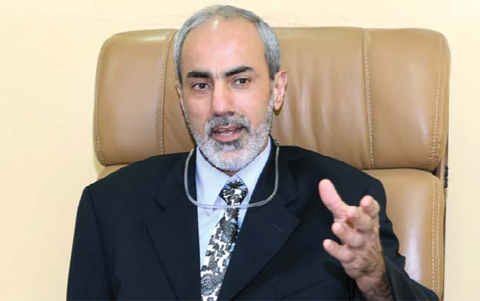 KUWAIT: Dr Marzouq Al- Bader, Director of the Medical License Department at the Ministry of Health, speaks to Kuwait Times. — Photo by Yasser Al-Zayyat
KUWAIT: Dr Marzouq Al- Bader, Director of the Medical License Department at the Ministry of Health, speaks to Kuwait Times. — Photo by Yasser Al-ZayyatKUWAIT: Fake doctors are the most dangerous among fraudsters as they play with people's lives and public health. Although Kuwait is known for its strict regulations for practicing medicine, a few sham doctors have been arrested. Kuwait Times met Dr Marzouq Al-Bader, Director of the Medical License Department at the Ministry of Health, which is in charge of issuing licenses to doctors to practice medicine, to learn more about the procedure.
Dr Bader was appointed to this post in Aug 2010. He is a surgeon and sometimes participates in the committees evaluating surgeons. Previously, he was head of the surgical department at Mubarak Hospital, head of the surgical departments' council in Kuwait and consultant in vascular surgery. He also used to participate in inspections for the private sector.
"As part of the inspections and investigations, I evaluate the applicant's experience certificate and performance. I used to investigate patients' complaints in the private sector in the surgical field to check if problems were caused by medical error, complications or other issues. Also, not all complaints are genuine; some may be malicious complaints, while some deserve to be investigated," he told Kuwait Times. Dr Bader explained that medical errors are not limited to fake doctors, and can happen with any doctor, even experienced ones. "We cannot accuse any doctor that his license is fake, as there is always a risk in our profession," he said.
Expat doctors
To employ expat doctors, the process starts with the employer selecting the doctor. "The employer submits an application to our department that he is willing to employ this doctor, after visiting the country where that doctor is working. The application should include the specialization of the doctor, in addition to the degrees and certificates (both academic and work experience)," explained Bader.
The doctor then has to accredit his academic degree. "The technical office sends his certificates to the Ministry of Higher Education to accredit them. If his degree is from a popular university, it is easier for us to confirm his data and degree online," he pointed out. The technical office at the department then sends the application to the section in charge of the doctor's specialization at the Ministry of Health.
"A committee then interviews the doctor and they issue a report about him. This committee may refuse the title that this doctor claims, as there are grades like A, B or C according to his experience. The committee consists of two or three members who are doctors practicing medicine in the public sector. They are usually Kuwaitis, but this is not a condition - they may sometimes be expat doctors. The members of the committee only change if the Minister of Health issues a decree in this matter," he added.
Same specialization
The committee is always formed from members of the same specialization as the interviewed applicant. "If the committee accepts him, then he may start working after undergoing medical checkups, which is usual for any foreigner coming to Kuwait before getting a residency. Apart from the medical checkups in his home country, the doctor also has to pass other medical tests for doctors here in Kuwait," stated Bader.
After the doctor completes this procedure, he gets a work visa and then gets the approval to practice medicine in Kuwait. "Some doctors may be rejected if they are not physically fit, or technically unfit," he explained. "So fake doctors cannot pass this procedure, but they may be working without a license, which is illegal and is considered a crime. This may be difficult to do in a clinic, and most probably it may be practiced in a small, poor area, especially where Asian bachelors stay," noted Bader.
Inspectors from the Ministry of Health regularly go on inspections to various hospitals and clinics. "Our department checks and inspects those who are licensed by us. So if a patient undergoes a medical procedure at a beauty salon for instance, we are not in charge of the complications that the patient may face, as salons are not licensed by us for this kind of work," he concluded.
By Nawara Fattahova










